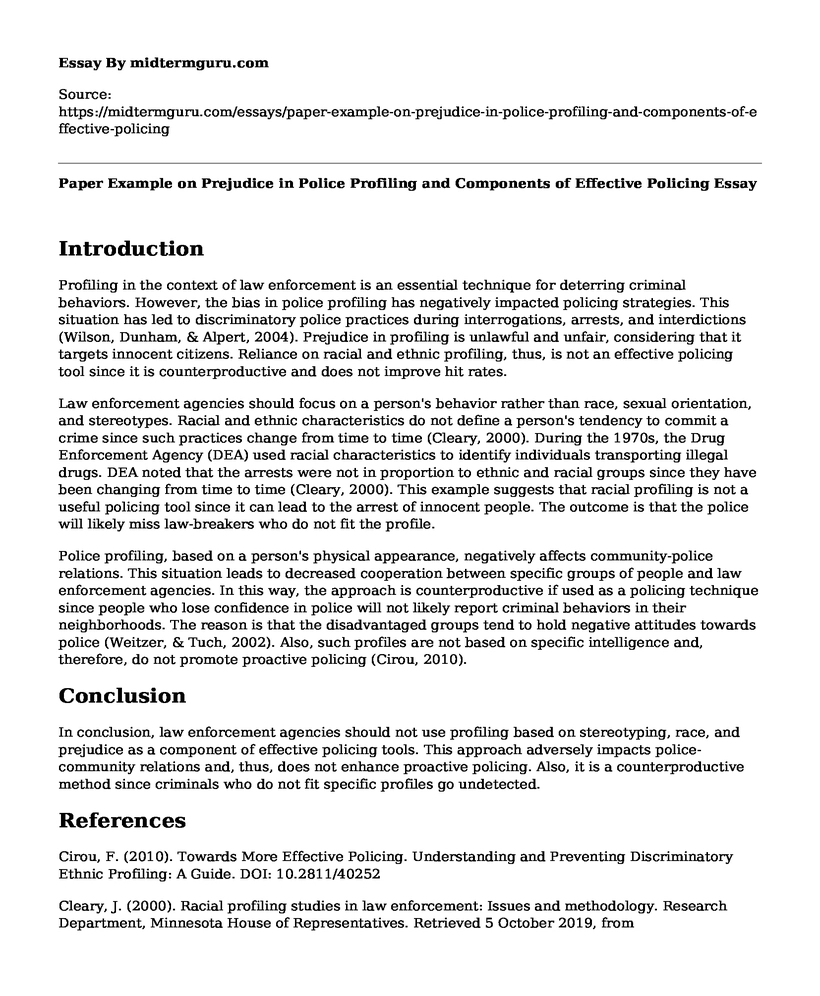Introduction
Profiling in the context of law enforcement is an essential technique for deterring criminal behaviors. However, the bias in police profiling has negatively impacted policing strategies. This situation has led to discriminatory police practices during interrogations, arrests, and interdictions (Wilson, Dunham, & Alpert, 2004). Prejudice in profiling is unlawful and unfair, considering that it targets innocent citizens. Reliance on racial and ethnic profiling, thus, is not an effective policing tool since it is counterproductive and does not improve hit rates.
Law enforcement agencies should focus on a person's behavior rather than race, sexual orientation, and stereotypes. Racial and ethnic characteristics do not define a person's tendency to commit a crime since such practices change from time to time (Cleary, 2000). During the 1970s, the Drug Enforcement Agency (DEA) used racial characteristics to identify individuals transporting illegal drugs. DEA noted that the arrests were not in proportion to ethnic and racial groups since they have been changing from time to time (Cleary, 2000). This example suggests that racial profiling is not a useful policing tool since it can lead to the arrest of innocent people. The outcome is that the police will likely miss law-breakers who do not fit the profile.
Police profiling, based on a person's physical appearance, negatively affects community-police relations. This situation leads to decreased cooperation between specific groups of people and law enforcement agencies. In this way, the approach is counterproductive if used as a policing technique since people who lose confidence in police will not likely report criminal behaviors in their neighborhoods. The reason is that the disadvantaged groups tend to hold negative attitudes towards police (Weitzer, & Tuch, 2002). Also, such profiles are not based on specific intelligence and, therefore, do not promote proactive policing (Cirou, 2010).
Conclusion
In conclusion, law enforcement agencies should not use profiling based on stereotyping, race, and prejudice as a component of effective policing tools. This approach adversely impacts police-community relations and, thus, does not enhance proactive policing. Also, it is a counterproductive method since criminals who do not fit specific profiles go undetected.
References
Cirou, F. (2010). Towards More Effective Policing. Understanding and Preventing Discriminatory Ethnic Profiling: A Guide. DOI: 10.2811/40252
Cleary, J. (2000). Racial profiling studies in law enforcement: Issues and methodology. Research Department, Minnesota House of Representatives. Retrieved 5 October 2019, from https://www.house.leg.state.mn.us/hrd/pubs/raceprof.pdf/url/
Weitzer, R., & Tuch, S. A. (2002). Perceptions of racial profiling: Race, class, and personal experience. Criminology, 40(2), 435-456. DOI: 10.1111/j.1745-9125.2002.tb00962.x
Wilson, G., Dunham, R., & Alpert, G. (2004). Prejudice in Police Profiling. American Behavioral Scientist, 47(7), 896-909. DOI: 10.1177/0002764203261069
Cite this page
Paper Example on Prejudice in Police Profiling and Components of Effective Policing. (2022, Sep 10). Retrieved from https://midtermguru.com/essays/paper-example-on-prejudice-in-police-profiling-and-components-of-effective-policing
If you are the original author of this essay and no longer wish to have it published on the midtermguru.com website, please click below to request its removal:
- Analysis of the Causes of Conflict in Pakistan - Paper Example
- Essay on Raising of Age to Purchase Cigarettes in the State of Minnesota
- Paper Example on Wireless Network Attacks
- Paper Example on Physician-Assisted Suicide and Hospital Policy
- Freedom of Speech: Right to Express Without Restriction - Research Paper
- Substance Abuse in Youth: Causes & Consequences - Essay Sample
- Media in Canada: Reflections & Relationships - Essay Sample







